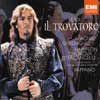Verdi Il Trovatore
Gheorghiu shines in a starry and largely strong cast; Pappano’s dramatic verve rivals even Karajan’s
View record and artist detailsRecord and Artist Details
Composer or Director: Giuseppe Verdi
Genre:
Opera
Label: EMI Classics
Magazine Review Date: 13/2002
Media Format: CD or Download
Media Runtime: 132
Mastering:
Stereo
DDD
Catalogue Number: 557360-2

Tracks:
| Composition | Artist Credit |
|---|---|
| (Il) trovatore |
Giuseppe Verdi, Composer
Andrew Busher, Messenger, Tenor Angela Gheorghiu, Leonora, Soprano Antonio Pappano, Conductor Enrico Facini, Ruiz, Tenor Federica Proietti, Ines, Soprano Giuseppe Verdi, Composer Ildebrando D'Arcangelo, Ferrando, Bass Larissa Diadkova, Azucena, Mezzo soprano London Symphony Orchestra London Voices Riccardo Simonetti, Old Gypsy, Bass Roberto Alagna, Manrico, Tenor Thomas Hampson, Count di Luna, Baritone |
Author:
We begin in the best of ways. D’Arcangelo offers the most convincingly sung‚ communicative version of Ferrando’s Narration since Zaccaria for both the Karajan versions listed above‚ and Pappano illuminates pages that can seem routine with the light of his perceptive baton. When Gheorghiu arrives‚ she conveys all Leonora’s sense of expectancy in her opening aria through glorious tone and attentive phrasing followed by a cabaletta that is accurate in every detail.
Onto the scene arrive both villain and hero. At once a familiarly wellgroomed voice and thoughtthrough approach to yet another new role is evident in Thomas Hampson; but on the debit side‚ so is the observation that‚ like FischerDieskau a generation earlier‚ his softgrained voice is not the right instrument for Verdi’s provocatively macho Luna. In the troubadour’s Serenade (the singer not‚ for once‚ placed too far off stage as in recent versions)‚ another wellknown voice appears‚ that of Alagna and – as with his antagonist – one’s pleasure at hearing such a musical approach is marred by the thought that a lyrical voice is being puffed up into music that doesn’t really suit it. Impressions of both men are only confirmed in the succeeding trio‚ although – with Pappano and the LSO in full cry – the dramatic picture is arrestingly painted.
At the subsequent gypsy camp scene‚ Larissa Dyadkova imposingly voiced Azucena is first heard. She has a vital personality‚ yet the slight touch of telltale rawness in her tone reveals she is a Russian. Dyadkova is a wellroutined and impressive performer‚ but neither here nor later does she quite get inside the character or sing it with the needed attention to detail: in ‘Stride la vampa’ she virtually ignores Verdi’s call for trills.
The remainder of the opera doesn’t really change those verdicts. The overall feeling of a disturbed society and disturbed principals is admirably depicted in the alert conducting‚ with the LSO in its current form top of the class‚ Pappano’s tempi instinctively the right ones – and‚ important this – the score given in its entirety‚ but with unwritten high notes admitted. Gheorghiu does virtually nothing wrong. Her delivery of the phrase in the Convent scene when she realises Manrico is both alive and has come to save her‚ is heartrendingly beautiful‚ the last act has real distinction‚ with the alternative high D flat near the end easily taken‚ and ‘Tu vedrai’ (with both verses) as supple and urgent as it should be. As she goes to her selfinflicted death‚ that ineffably lovely phrase of Leonora’s is sung to perfection.
Hampson is all menace‚ but does one really believe in his portrayal? Alagna is well suited by his aria‚ pushed uncomfortably in its famous cabaletta‚ ‘Di quella pira’‚ but in the final scene in prison he‚ as do so many Manricos‚ produces his most appealing form including some delicate pianissimo singing. Dyadkova remains impressive in a kind of generalised way‚ but she does betray signs of wear in extremis.
When it comes to the inevitable comparisons‚ the new set has some famous versions to contend with. The two‚ very different Karajan sets‚ one made in the studio‚ the other a legendary Salzburg staging of the piece‚ both in mono‚ have unbeatable casts. They are stronger in the male department‚ Ferrando apart‚ than in the present case‚ and with Callas and Leontyne Price offering different though not necessarily better insights than Gheorghiu into Leonora’s plight.
The Mehta has stood the test of time‚ with a superb cast of the last generation and all the singers in their prime. The Schippers‚ at superbargain price‚ is a performance of basic emotions hard to equal. The most recent competitor‚ Muti live at La Scala‚ is superior in only one respect to the new one in Urmana’s faultless Azucena‚ with Frittoli equalling but not surpassing Gheorghiu as Leonora. Where the new set scores is in the work being given complete under a conductor who matches‚ sometimes surpasses even Karajan in fulfilling Verdi’s wishes.
Discover the world's largest classical music catalogue with Presto Music.

Gramophone Digital Club
- Digital Edition
- Digital Archive
- Reviews Database
- Full website access
From £8.75 / month
Subscribe
Gramophone Full Club
- Print Edition
- Digital Edition
- Digital Archive
- Reviews Database
- Full website access
From £11.00 / month
Subscribe
If you are a library, university or other organisation that would be interested in an institutional subscription to Gramophone please click here for further information.




